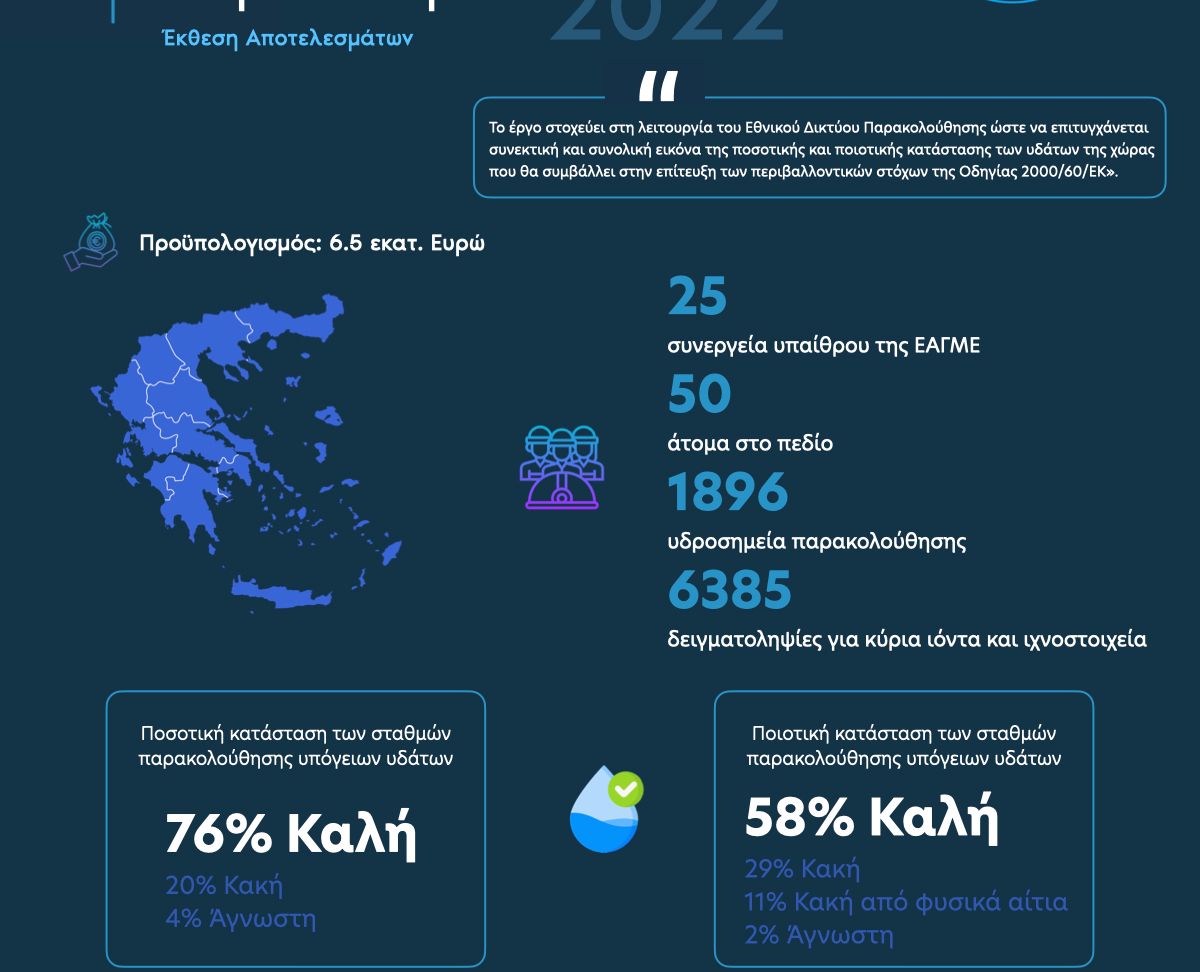The Hellenic Authority for Geological and Mineral Research (EAGME), within the framework of the project “Groundwater Monitoring Network” (DIPYN), delivered the 2022 Results Report to the Directorate for the Protection & Management of the Aquatic Environment of the Ministry of Environment and Energy (YPEN).
The DIPYN project aims to operate the National Water Monitoring Network in order to achieve a coherent and comprehensive picture of the quantitative and qualitative status of the country’s groundwater, contributing to the attainment of the environmental objectives of Directive 2000/60/EC.
During 2022, four (4) sampling and field measurement campaigns were carried out in February, April, July, and October. A total of 6,385 samples were collected for major ions, nitrogen compounds, phosphate compounds, and trace elements, from 1,896 monitoring sites distributed across the country.
Fieldwork was conducted by 25 EAGME field teams comprising 50 people, while the related chemical analyses were performed at the Water Analysis Laboratory of EAGME.
The field measurements included:
- Measurements of groundwater levels in boreholes/wells and spring discharges, and
- Measurements of physicochemical parameters (pH, conductivity, dissolved oxygen, water and air temperature).
The water sample analyses included:
A. Major ions (Ca, Mg, Na, K, HCO3, Cl, SO4),
B. Nitrogen (NO3, NO2, NH4) and phosphate (PO4-P) compounds,
C. Hardness (total, temporary, and permanent),
D. Heavy metals / trace elements (Fe, Mn, Cu, Crtotal, Cr6+, Ni, Pb, Cd, Al, As, Hg), and
- E. Organic solvents and pesticides.
Based on the available chemical analyses and field measurements, the following classification was made regarding the Quantitative and Qualitative Status of the Groundwater Monitoring Stations in Greece.
Quantitative Status of Groundwater Monitoring Stations
76% Good Status
20% Poor Status
4% Unknown Status
Qualitative Status of Groundwater Monitoring Stations
58% Good Status
29% Poor Status
11% Poor Status due to natural causes
2% Unknown Status
The degradation of the quantitative and qualitative characteristics of groundwater continues to be observed in areas of intensive aquifer exploitation. Nitrate pollution and seawater intrusion remain the main factors of degradation, associated respectively with the use of nitrogen fertilizers and seawater intrusion due to overpumping. A small percentage of exceedances in heavy metal/trace element and chloride ion concentrations are attributed to natural causes.
The results of the Annual Evaluation Reports of the DIPYN project are further utilized in the preparation of the revised River Basin Management Plans, with the ultimate goal of informing management policies and ensuring the sustainable use of groundwater resources.
The DIPYN project is funded by the Operational Programme “Transport Infrastructure, Environment and Sustainable Development” of the NSRF 2014–2020(2023), with Scientific Coordinator Vasileios Zorapas – Hydrogeologist M.Sc., Head of the Department of Hydrogeology and Hydrology (YDROPGE).


